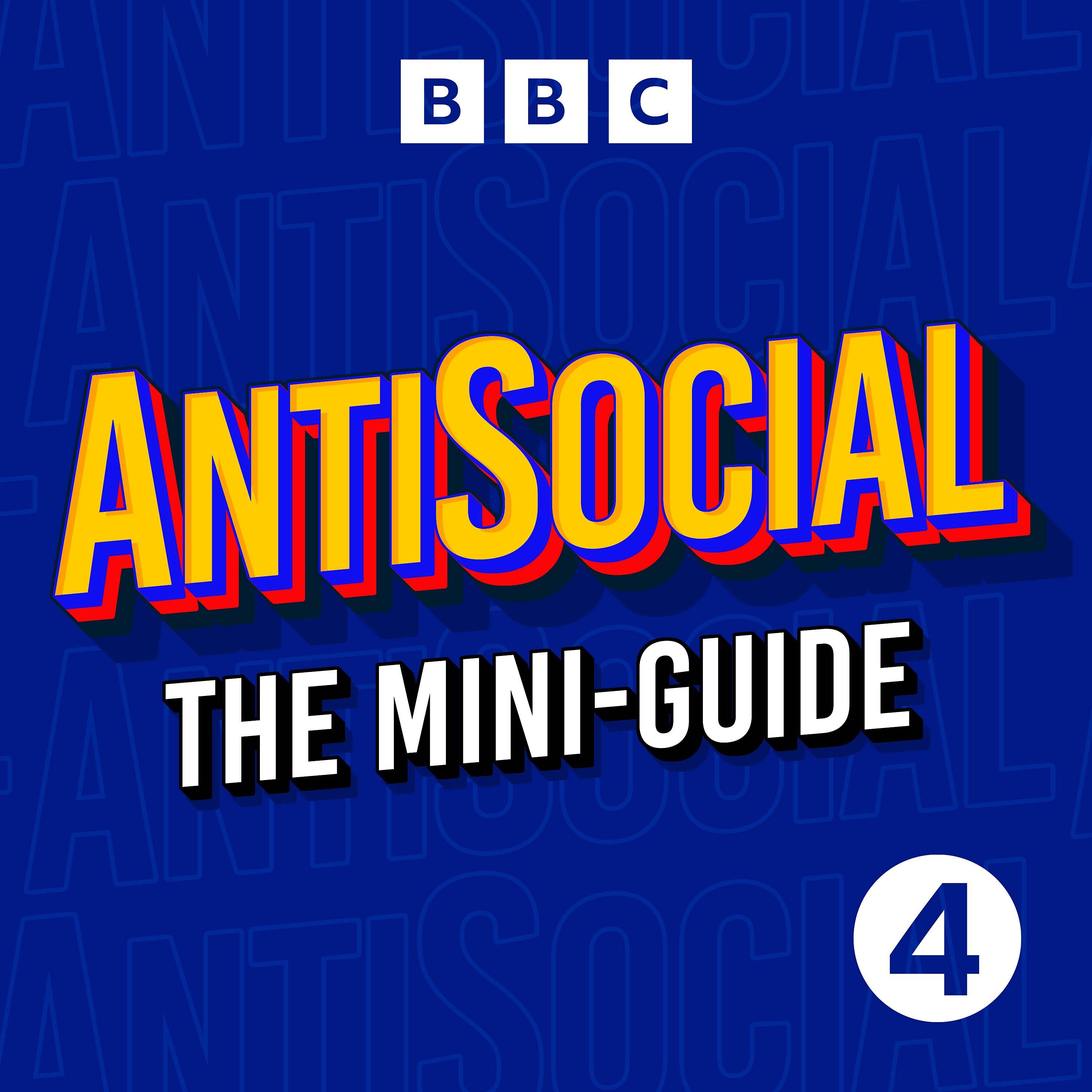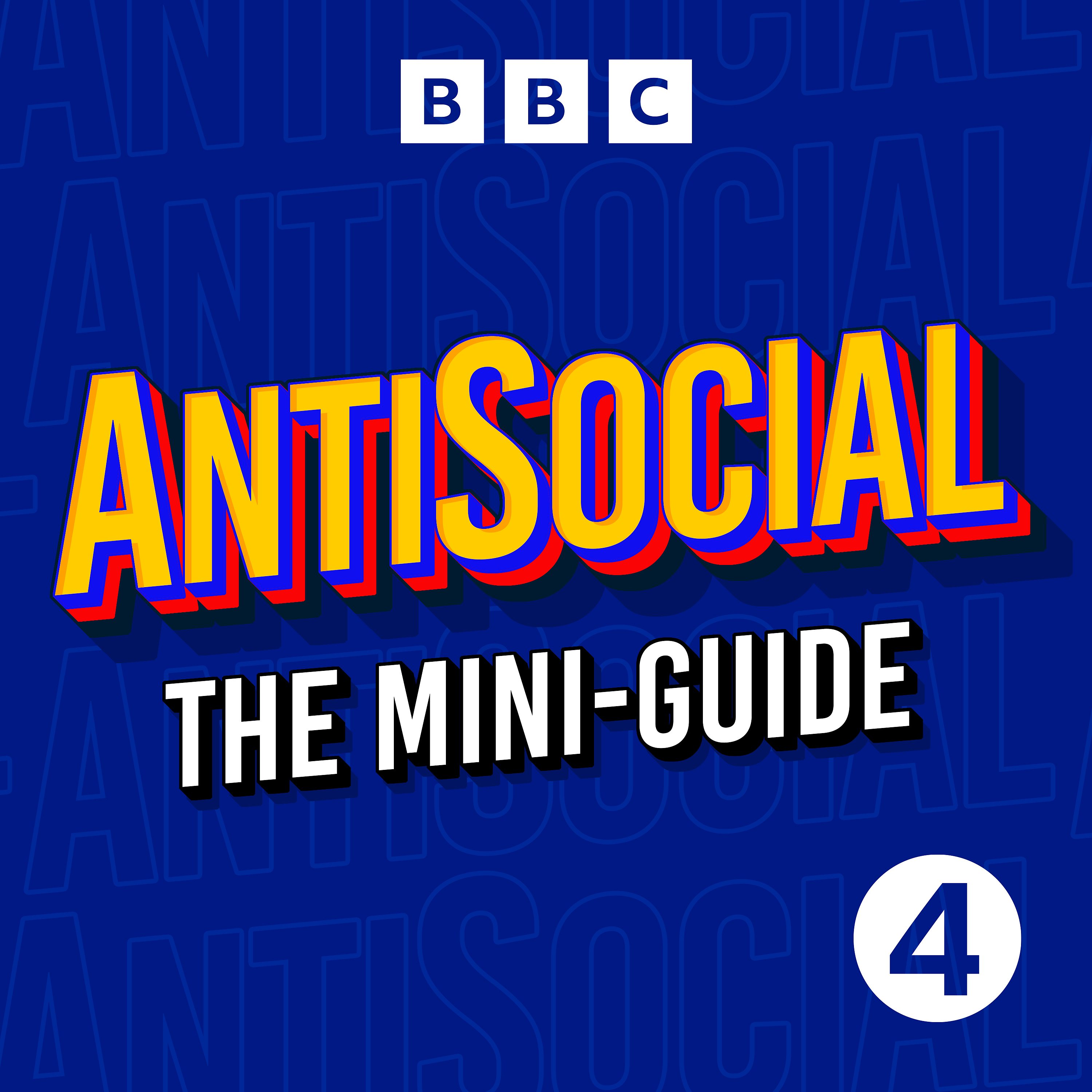Discover AntiSocial
AntiSocial

AntiSocial
Author: BBC Radio 4
Subscribed: 241Played: 8,772Subscribe
Share
© (C) BBC 2024
Description
Peace talks for the culture wars.
In an era of polarisation, propaganda and pile-ons, AntiSocial offers an alternative: understanding, facts, and respect. Each week, Adam Fleming takes on a topic that's generating conflict on social media, blogs, talk shows and phone-ins and helps you work out what the arguments are really about.
77 Episodes
Reverse
Should meat and dairy be taken off menus to help save the planet from climate change?A university is accused of “going woke” after reports it is transitioning to 100% plant-based catering by 2027. Climate activists are calling on universities and other public bodies like councils to ditch animal food products to help tackle the climate crisis. But what did the university in question actually decide and how widespread is the shift to plant-based menus? What’s the evidence about the climate impact of meat and dairy versus vegan alternatives? And what is the best way to change people’s behaviour when it comes to what they eat?Presenter: Adam Fleming
Producers: Simon Maybin, Jordan Dunbar, Ellie House, Natasha Fernandes
Editor: Bridget Harney
The term “Anglo-Saxon” has become controversial, but where does it come from?As people argue online about whether the term is tainted by racism, history professor Joanna Story tells its origin story.
Should the term “Anglo-Saxon” be dropped because it’s been adopted by racists?People online are angry because a history journal has dropped “Anglo-Saxon” from its title. Critics say it is pandering to American academics who are unduly worried about the term being used by white supremacists. The journal says that’s got nothing to do with it. It’s part of an ongoing debate about whether “Anglo Saxon” is useful and appropriate. How did the argument start? Where did the term actually come from? And how has it been used in modern times to talk about race?Presenter: Adam Fleming
Producers: Simon Tulett, Simon Maybin, Natasha Fernandes
Editors: Bridget Harney, Sam Bonham
Pro-Palestinian student protesters have called for their universities to divest from firms with links to Israel, and specifically the conflict in Gaza, but how would that actually work? Adam Fleming discusses the practicalities and protest history of divestment with Chris Marsicano, assistant professor of higher education and public policy at Davidson College, in North Carolina.
The debate about protestors calling for their universities to cut ties with Israel.Encampments of students protesting about Israel’s military action in Gaza have been popping up on campuses across the UK. They’re calling for their institutions to divest from - sell their stakes in - companies linked to the conflict or Israel, but others say they’re demonising the country and stoking antisemitism. How did the movement start and how have universities been responding? What’s the history of political activism around university investments? And what does the law say about pitching tents on university land?Presenter: Adam Fleming
Producers: Simon Maybin, Simon Tulett, Ellie House, Jameel Shariff
Where did the trend for tough discipline in schools come from?
It’s led to a big argument online about how strict is too strict. Education journalist Laura McInerney explains the origins of the trend.
A photo of a school corridor, showing three posters describing a particular teaching ethos, has started a debate about the right level of discipline in classrooms.Some suggest the instructions, which include ‘sit up’, ‘eye contact’ and ‘smile’, are indicative of a super-strict approach some schools have taken, which might be distressing for children, especially those with special needs. We find out where this approach came from, and hear about the American educator who popularised the all-important acronym ‘SLANT.’ Supporters of the approach say strict discipline is essential for learning, and that it generates better outcomes. What evidence is there to back this up?Presenter: Adam Fleming
Producers: Simon Tulett, Simon Maybin, Ellie House, Jay Gardner
Editor: Richard Vadon
A hypothetical question, asking women whether they would rather be stuck in the woods with a man or a bear, has gone viral on TikTok. It’s got people talking about gender-based violence, sexual assaults, and men’s mental health. But where did this thought experiment come from? The BBC’s Ellie House talks Adam Fleming through the thought experiment’s origins and evolution.
Women online are being asked: would you rather be stuck in a forest with a man or a bear?Most are saying they’d choose the bear, saying that men are potentially more dangerous to them than the wild animal. Cue arguments on social media about just how dangerous to women men are. Where did the meme come from? What can crime stats tell us about gender and violence, including sexual violence? And how has the way our society views violence between men and women developed over time?Presenter: Adam Fleming
Producers: Simon Maybin, Simon Tulett, Ellie House, Jay Gardner
Editor: Richard Vadon
Marriage, kids, and the history of our ideas about adulthood.Laura Tisdall, lecturer in modern British history at Newcastle University, explains the shifting milestones of adult life.
Harry Potter actor Miriam Margolyes has told adult fans of the franchise to grow up, prompting a discussion about whether younger generations are delaying the responsibilities of adulthood.It’s a debate that spans culture and economics, so we look at what the data and the history tell us. Is there evidence that the ‘kidult’ is a real phenomenon, where do our ideas of adulthood actually come from, and what on earth is a ‘Disney Adult’?Presenter: Adam Fleming
Producers: Simon Tulett, Simon Maybin, Nathan Gower
Editor: Penny Murphy
Cyclists and motorists can clash on our roads, often about who has priority, but what does The Highway Code say? Louise Gardner, from the law firm Hugh James, talks Adam Fleming through the key points and latest updates in the UK’s road safety guide.
Cyclists shaming drivers online, fights over bike lanes, and the politics of pedal power.
TV and radio presenter Jeremy Vine posts a video of a car failing to give way to him while he’s riding a penny farthing. Cue angry comments hurling insults and telling him he’d be safer in a car - and sympathetic responses from fellow cyclists. What does the Highway Code actually say about priorities on the roads? What are the stats on cyclists and safety? And how and why has cycling become such a toxic topic?
Presenter: Adam Fleming
Producers: Simon Maybin, Simon Tulett, Nathan Gower
Editor: Richard Vadon
Social psychology professor David Frost from University College London explains the theory that people in stigmatised minority groups experience unique forms of social stress.
The clash between the rights of LGBT people and freedom to express Christian views.An employment tribunal is set to rule on whether a mental health charity in Leeds was right to withdraw a job offer from a Christian social worker who thinks homosexuality is a sin. How can employers - and our legal system - balance the sometimes competing rights of different minority groups? How Christian is Britain these days anyway? And what is “minority stress theory”?Presenter: Adam Fleming
Producers: Simon Tulett, Simon Maybin, Ellie House, Jameel Shariff
Editor: Penny Murphy
Rural parts of the UK have recently been described as 'colonial', predominantly white spaces, where members of ethnic minorities feel unwelcome, sparking a debate about whether the countryside is racist. Data shows that the rural population is 97% white, much more so than in towns and cities, so might that be an explanation for some people feeling out of place? Why has a prominent museum rehung some of its paintings, adding context about the nationalist sentiment some of them might evoke? And how did this debate start in the first place? We track its evolution and the contested evidence at the heart of it. Presenter: Adam Fleming
Producers: Simon Tulett, Ellie House, Arlene Gregorius and Ajai Singh
Editor: Richard Vadon
Amidst conflict in the Middle East, some people have been calling for Israel to be banned from the Eurovision Song Contest. Now that Israel’s participation in the 2024 competition has been confirmed, critics are vowing to boycott the event in protest.
Eurovision’s organisers say that the song contest is “a non-political music event and a competition between public service broadcasters”, not between governments. But over the years, Eurovision has found itself caught up in controversy and geopolitics.
Adam Fleming charts this history with Dean Vuletic, historian and author of ‘Postwar Europe and the Eurovision Song Contest’.
One of the UK’s biggest Eurovision parties has been cancelled in protest at Israel’s inclusion, so how worthwhile is a boycott of the event as a response to the war in Gaza? The song contest’s organisers say the event is non-political, but this isn’t the first time global events have had an impact on participation and even lyrics - we chart the key moments. And it’s not the first time Israel’s participation has sparked debate - a Eurovision expert talks us through the ups and downs of its long association with the event. We’ll also hear about the controversy around Israel’s song this year and how it’s changed, plus the view from the Middle East on what Israelis and Palestinians are saying. Presenter: Adam Fleming
Producers: Simon Tulett, Simon Maybin, Ellie House and Paige Neal-Holder
Editor: Penny Murphy
In anticipation of new hate crime legislation in Scotland, people have been arguing about whether misgendering - for example referring to a trans woman as a man - should be against the law. Adam Fleming speaks to Sharon Cowan, professor of feminist and queer legal studies at the University of Edinburgh, to find out how this question has been handled elsewhere in the UK.
Exploring the debate around gender, pronouns, and Scotland’s new hate crime law.People online are threatening to report misgendering - for example referring to a trans woman as a man - to the police. They say new Scottish legislation due to come into force in April will make misgendering a criminal offence. What does the new law actually say? What existing laws apply across the UK around misgendering? And does Scotland’s new law prioritise trans people over women?Presenter: Adam Fleming
Producers: Simon Maybin, Simon Tulett, Ellie House, Paige Neal-Holder
Editor: Richard Vadon







